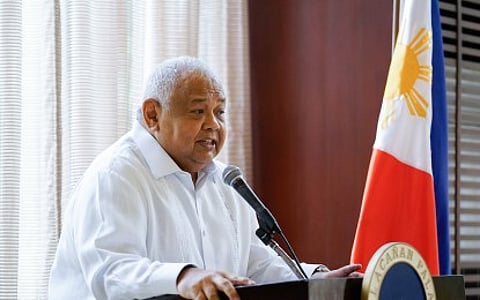No Duterte-Xi deal, Medialdea tells House
Former President Rodrigo Duterte did not make a secret deal with Chinese President Xi Jinping regarding the BRP Sierra Madre, certainly not one pledging not to repair the grounded ship which serves as a permanent military outpost at Ayungin Shoal in the West Philippine Sea.
Former executive secretary Salvador Medialdea, who had served in that capacity in the Duterte administration, emphasized this during a hearing of the House Committee on National Defense and the Special Committee on the West Philippine Sea.
Delfin Lorenzana, former defense secretary under Duterte who also testified, echoed Medialdea. In fact, Lorenzana said, repairs were made to the BRP Sierra Madre, which was intentionally grounded on Ayungin in 1999 to assert the Philippines’ sovereignty in the area. Nonetheless, the ship is a hulking mass of rusted steel at present.
“It is not true that we did not do some repairs. Because in 2021 that was when China started bombarding us with water cannons because they claimed that we were bringing repair materials to the Sierra Madre,” Lorenzana said.
Medialdea and Lorenzana vehemently denied knowing that Duterte had entered into an unwritten agreement with President Xi.
According to Medialdea, Duterte and Xi had eight official meetings from October 2016 to August 2019, during which the former chief executive was always accompanied by his foreign affairs secretaries.
Those DFA chiefs were, one after the other, the late Perfecto Yasay Jr., Alan Peter Cayetano and Teodoro Locsin, as well as then acting secretary Enrique Manalo.
Medialdea asserted that during that period, no gentleman’s agreement was reached between the two presidents.
“President Duterte, being a lawyer, knew fully well that it would be foolhardy to enter into an agreement, especially a gentleman’s agreement at that, with the president of the People’s Republic of China on matters involving sovereign rights,” Medialdea said.
Likewise, Lorenzana said Duterte firmly asserted the country’s sovereign rights in the WPS during his last meeting with Xi in 2019.
“President Duterte asserted in front of everybody at the bilateral meeting the rights of the Philippines over the West Philippine Sea on the basis of UNCLOS and the arbitral ruling, upon which President Xi said that ‘we are subclaiming the area.’ That’s where the conversation ended on the West Philippine Sea,” he said.
Duterte himself has denied making a secret deal with Xi on the WPS, but admitted to agreeing to maintain the status quo in the contested waterway, in which no armed patrols would move into the area to avoid tension and war.
The alleged agreement is widely believed to have given China the leverage to shift the blame for the escalating tensions in the WPS on the Philippines.
At the same time, Medialdea said the so-called “status quo” agreement between the Philippines and China on the resupply missions to the BRP Sierra Madre was forged during the Aquino administration.
Medialdea maintained the “gentleman’s agreement” was initially agreed to by then President Benigno Aquino III’s defense secretary, Voltaire Gazmin, and former Chinese Ambassador to the Philippines, Ma Keqing.
Purportedly, the deal would allow the Philippines to resupply with food and water its troops stationed on the BRP Sierra Madre.
China has repeatedly cited the deal to justify incidents where its Navy, coast guard and militia ships rammed or used water cannons against Philippine vessels resupplying the Sierra Madre, allegedly not just with food and water but also construction materials for its repair.
He said Gazmin’s alleged commitment to supply the troops on the Sierra Madre only with food and water was made to Keqing in 2013. Medialdea said he obtained the information from a former official he did not name.
“It was an off-the-cuff query when the (Permanent Court of Arbitration) decision was about to come out. That was what I recall when the decision came out 12 days after we assumed office. I was just asking around,” Medialdea said.
He said that Duterte merely adopted the Gazmin deal, saying there was a “continuation because that was what was respected. We have [had] to follow that.”
On 12 July 2016, the Permanent Court of Arbitration favored the Philippines over China’s supposedly historic rights over the entire South China Sea, which overlaps the WPS. The decision came out barely 12 days after Duterte assumed office.
During the hearing, 1-Rider Partylist Rep. Ramon Gutierrez questioned why the Duterte administration continued to abide by the supposed agreement when it could have fiercely asserted its sovereignty over Ayungin Shoal following the arbitral ruling.
“We can’t help but express our surprise. In 2016, when the arbitration ruling came out explicitly saying that we have sovereign rights over our exclusive economic zone, the supposed status quo was not changed,” Gutierrez said.
“I think if that were the case, we could have postured our foreign policy anchored on the PCA ruling,” he said.


